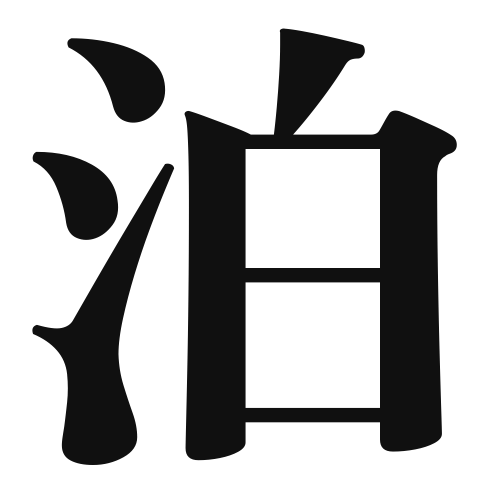1. Overview of Meaning
The kanji “泊” (pronounced “haku” or “baku”) primarily means “to stay” or “to lodge.” It is often used in the context of staying overnight at a place, such as a hotel or a friend’s house.
2. Formation and Radical
Formation of the Kanji: The kanji “泊” is a phonetic compound (形声文字), which combines the meaning of “water” (氵) and the sound component “白” (haku), which means “white.” The water component suggests a connection to the sea or a body of water, which is relevant to the idea of staying or anchoring.
Radical: The radical of “泊” is 氵, which is related to water.
3. Examples of Usage
Common Words and Phrases:
- 宿泊 (しゅくはく, shukuhaku) – lodging, accommodation
- 泊まる (とまる, tomaru) – to stay (overnight)
Example Sentences in Daily Conversation:
- 今晩、友達の家に泊まります。 (I will stay at my friend’s house tonight.)
- このホテルは一泊いくらですか? (How much is it for one night at this hotel?)
4. Synonyms and Antonyms
Similar Kanji:
- 滞 (たい, tai) – to stay, linger (often used in a more formal context)
Opposite Kanji:
- 去 (きょ, kyo) – to leave, depart
5. Cultural and Historical Background
Connection to Japanese Culture: The concept of “泊” is significant in Japanese culture, especially in relation to travel and hospitality. Staying at a ryokan (traditional inn) is a common experience for both locals and tourists.
Proverbs and Idioms: There are various expressions related to staying or lodging, such as “泊まりがけ” (とまりがけ, tomarigake), which refers to a trip where one stays overnight at a destination.
